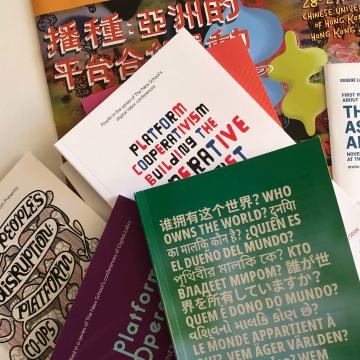Ampled – a music platform that gives artists their due
Blog post

Ampled is a Brooklyn based ethical web platform that allows musicians to be supported by their community with direct, recurring payments.
UnFound is a UK-based accelerator and business support programme for platform co‑ops. As part of our ongoing support of the programme, we’re publishing a Q&A series, in partnership with Stir to Action. The interviews are with a group of platform founders who share their experiences of building teams, raising finance, and user experience. See our UnFound Accelerator pages for more information and to find out when the next programme is running.
Structured as a co-op, Ampled is 100% owned by its artists, workers, and community (not venture capital investors) with the ultimate goal of creating a permanent vehicle for artist prosperity – not an acquisition or exit.
As an organisation, Ampled has positioned itself in stark contrast to the Silicon Valley ethos through a commitment to radical transparency, democratic governance and broad-based user ownership. Founded in 2019 by a group of designers, software engineers and musicians, Ampled helps artists gain sustainable and predictable income in today’s streaming economy – and gives them agency and ownership of a platform they rely on.
We spoke with Austin Robey, one of Ampled’s co-founders.
What gave you the initial inspiration and confidence to start a platform co-op?
Ampled was initially conceived as an opportunity to meet an unmet need, not as a ‘platform co-op.’ We saw that there was a desire and need for direct, recurring community support for musicians, and that there were several reasons why musicians were hesitant to use a platform like Patreon.
In brainstorming ways for Ampled to reinforce a collective, community-driven ethos, we were intrigued by the idea of shared ownership. After reading Ours to Hack and to Own, we decided to commit fully to becoming a co-operative.
In the platform economy, the initial unpaid labour involved in building a product is a trade-off for the promise of a big payout when the business is eventually sold to an external investor. How do you build a team where this option does not exist? Can you explain your story so far?
It’s true that co-operative platforms are at a disadvantage because of the lack of a supportive fundraising ecosystem, and limited financial upside. To address this, we have structured collective labour input as an investment through a time banking system. This allows us to primarily resource Ampled with people, not money. Each week, our contributors get an email that allows them to self report hours, which updates the Ampled time bank. We are setting aside 10% of our revenues in order to repurchase the value of labour through ‘time buybacks.’ This allows us to record, recognise and reward sweat equity – while keeping all workers on equal standing. No worker has more ownership or control than any other worker.
Financing a platform co-operative is a challenge, but there’s excitement about testing existing forms of equity in the sector. What’s your funding mix and how do you see it changing in the next five years?
We do not have any equity financing. Besides collective labour, we’ve only accepted investment through revenue-based debt financing. We want to maintain consistency and clarity in our messaging and narrative. And we want to make sure that Ampled is 100% owned by artists and workers. We have chosen to not have any investor equity class.
We also help finance ourselves through our community membership. People can support Ampled through our community page (which is like an Ampled page for Ampled). By doing this, someone can become a ‘community member.’ We have given governance rights and board representation to community members as an important stakeholder class within Ampled.
Platform co-ops are about rebalancing power but this can be unavoidably complex. How do you find the right governance model that offers a ‘cultural fit’ for your community and business purpose?
We have centred artists and workers, while also creating space for others to get involved through community membership. These three key stakeholder groups (artist-owners, worker-owners, and community members) each elect three board representatives. The goal for the board is to create and oversee a system of decentralised, participatory and inclusive governance and operations. It stewards the process by which work is carried out.
What should business support programmes offer to make a platform co-op founder’s journey easier?
Debt-based financing, facilitation of warm investment connections with impact investors and philanthropic orgs that are traditionally outside of the co-operative space.
While raising finance is always presented as the most difficult challenge for early-stage platforms, your ‘route to market’ is really important. Platform Co-ops are much closer to their users and customers than traditional businesses, so what are your channels for selling your services?
We don’t want to advertise with Google or Facebook, so we’re primarily getting initial buy-in from artists by directly reaching out to them. We’ve benefitted from an inherent flywheel effect that happens when artists launch their pages. Other artists see this and reach out to start pages as well. Also, we’ve leveraged our collective labour and time banking system to bring on contributors to specifically focus on outreach to artists.
Many assume that co-operatives have flat pay structures. Can this work in the tech sector? What is your pay structure?
We set up a time bank to address this question of how to measure the input of all of our sweat equity and do it in a way that both recognises it and rewards it – but also doesn't give anyone any outsize ownership or control.
It’s analogous to stock buybacks, but we’re doing time buybacks. We’ve come to an agreement that every contributor’s hour is worth the same – it doesn’t matter if you’re a software engineer or an intern – and that we would purchase those hours back when we have the funds to do that. We got a small grant to help support and build a more robust time bank system that maybe other people could use too. And we're using that initial grant money as the initial pool for everybody.
For salaries, it’s harder to say because there’s only one salary at the moment (mine). We do have a maximum wage that we outlined in our bylaws. And I think we’ll probably want to have a minimum wage in there, too, that’s also a liveable wage.
Do flat pay structures work in the tech sector? It depends on what everyone else’s tolerance is. I think time is the other variable here. There are a lot of people who care a little bit less about how much they’re getting paid and more about what they can do with their free time, whether or not this is something that demands their attention eight or nine hours a day, or whether it's something that they could step away from or choose how much they want to work on it, and when they want to work on it.
Based on your experience, what advice would you give to others who are at an earlier stage of becoming a platform co-op?
Use time to your advantage. Don’t rush things. Keep everything loose and pencilled in, and start with an emphasis on people. And also, focus on the product and make sure it works.
Having the people on board is the foundation of trust in the culture and spirit of the platform – and in a lot of ways that's so much more important than bylaws. If the right culture is set first, then I think some of the rules can follow.
But the product has to work and it has to be something that people want. I think that's probably a deficiency across the spectrum of the platform co-op space – there’s not enough focus on product. Product can be like the fifth or sixth priority in some organisations. No matter what, your platform has to be something that people want to use and it still has to compete, from a user experience perspective, with other platforms that have a lot of funding behind them.
Find out more
.png)
Have you got an idea for a digital or platform business?

2023 UnFound Accelerator

Start a platform co-op

Why platform co-ops?




